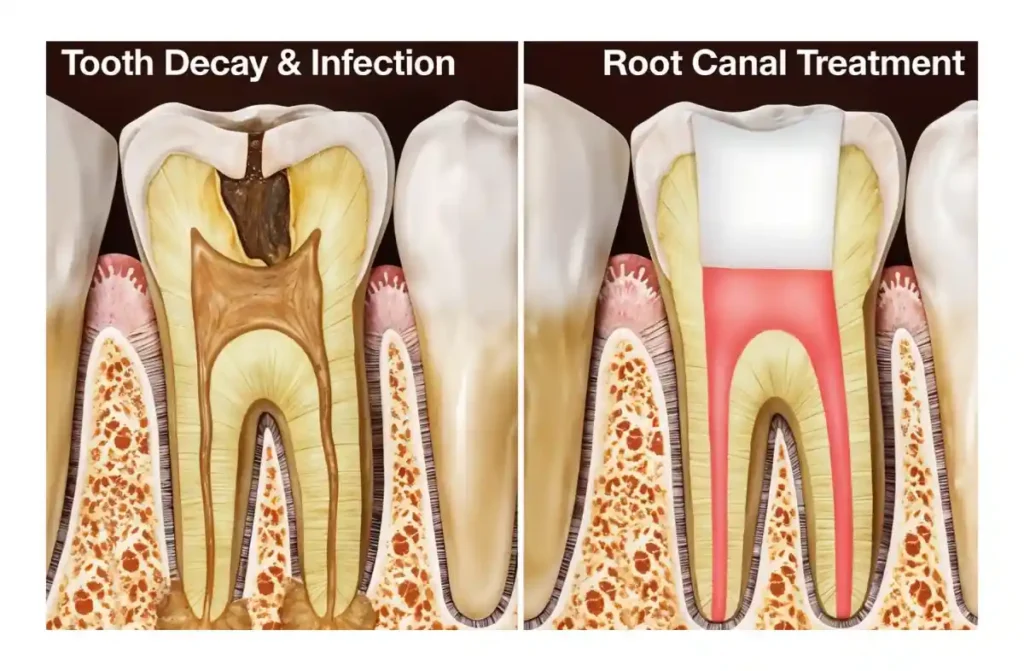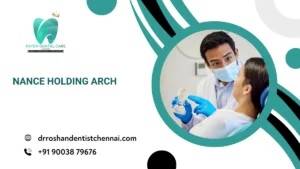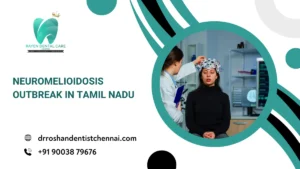Root canal treatment in Chennai is a common dental procedure that is designed to treat issues related to the interior of your teeth. Whether it’s due to infection, decay, or trauma, root canal treatment can help save a damaged tooth and prevent more severe oral health problems. At Rayen’s Dental Clinic, we specialize in providing top-notch root canal treatments with a focus on comfort, precision, and excellent results. In this guide, we will take a closer look at what root canal treatment involves, its benefits, and why it might be the solution you need to keep your smile healthy.
What Happens Inside the Tooth During a Root Canal?
Inside every tooth, beneath the enamel and dentin layers, lies a soft tissue called the pulp. This pulp contains nerves, blood vessels, and connective tissue that help the tooth grow during childhood. However, when this pulp becomes infected due to deep decay, cracks, or trauma, it causes severe discomfort and swelling.
During a root canal treatment in Chennai, the infected pulp is carefully removed to stop the infection from spreading. After removing the pulp, the empty canals are cleaned, disinfected, and sealed to prevent further bacterial invasion. Clinics performing root canal treatment in Nungambakkam use specialized tools to clean the narrow canals thoroughly, ensuring that no bacteria remain trapped inside. This treatment restores the tooth’s structure, allowing it to function like a natural tooth while preventing future pain and complications.

Benefits of Root Canal Treatment
There are numerous benefits of root canal treatment, especially for those who want to avoid tooth extraction and its consequences. Here are some key advantages:
- Tooth Preservation: Root canal treatment allows you to keep your natural tooth, which is always preferable to removal.
- Pain Relief: It eliminates the pain caused by infection or damage within the tooth.
- Restoration of Function: After treatment, the tooth is restored to its full function, allowing you to chew and speak normally.
- Prevention of Further Damage: Root canal treatment helps prevent further decay and infection in the affected tooth, protecting the surrounding teeth and gums.
At Rayen’s Dental Clinic, we take great pride in offering root canal treatment in Chennai with a focus on preserving your natural teeth and improving your overall dental health.
Who Might Need a Root Canal Treatment?
Root canal treatment is typically needed when a tooth becomes severely damaged or infected. Here are some of the common reasons why someone might need a root canal:
- Severe Tooth Pain: Ongoing or intense tooth pain, especially when chewing or applying pressure.
- Sensitivity to Hot and Cold: A tooth that remains sensitive to hot or cold for long periods, even after removing the stimulus.
- Swollen Gums: Gums that are swollen, tender, or discolored around the affected tooth.
- Tooth Discoloration: A tooth that becomes dark or discolored, indicating infection in the pulp.
- Abscess Formation: A pimple-like bump or pus near the infected tooth, which could indicate an abscess or infection spreading.
- Tooth Decay: When tooth decay extends deep into the tooth pulp, root canal treatment is necessary to remove the infected material.
- Trauma: A tooth that has been cracked or broken due to injury may require root canal therapy if the damage affects the pulp.
- Abscess: If an infection in the pulp spreads, it can create an abscess, leading to pain, swelling, and sometimes a fever. A root canal is required to remove the infection and prevent it from spreading.
- Infection: Persistent infections caused by bacteria can be eliminated with a root canal, preventing the need for tooth extraction.
Root Canal Treatment Cost in Chennai
Root canal treatment is a common dental procedure used to save severely infected or decayed teeth. The cost of root canal treatment in Chennai varies based on several factors, including the clinic’s reputation, dentist’s expertise, technology used, and the specific tooth being treated. Chennai, as a leading metropolitan city, offers a wide range of dental clinics, from affordable dental care centers to premium multispecialty hospitals.
| Tooth Type | Estimated Cost Range (INR) | Factors Influencing Price |
| Front Tooth (Single Root) | ₹2,500 – ₹5,000 | Simple structure, fewer canals |
| Premolars (1-2 Roots) | ₹4,000 – ₹7,000 | Moderate complexity |
| Molars (2-3 Roots) | ₹5,500 – ₹12,000 | Complex structure, multiple canals |
| Re-root Canal Treatment | ₹6,500 – ₹15,000 | Previous treatment failure, complex procedure |
| Laser-assisted Root Canal | ₹7,000 – ₹18,000 | Advanced technology, faster healing |
| Crown (optional but recommended) | ₹3,000 – ₹15,000 | Material (metal, ceramic, zirconia) and durability |
Procedure for root canal treatment
Root canal treatment is a specialized dental procedure performed to save an infected or severely decayed tooth rather than extracting it. Clinics that offer root canal treatment in Nungambakkam and root canal treatment in Chennai follow a detailed process that involves cleaning and sealing the tooth to prevent future infections. This treatment ensures long-term dental health when performed with precision and care.
Initial Consultation and Diagnosis
The process begins with a thorough examination where the dentist checks for symptoms like severe toothache, sensitivity to hot or cold, or swelling around the gums. An X-ray of the affected tooth is taken to assess the infection’s severity and determine if root canal treatment in Chennai is required. The dentist explains the procedure, the number of sessions needed, and the estimated cost during this consultation.
In some cases, advanced diagnostic tools such as pulp vitality tests are used to evaluate the condition of the dental pulp and confirm the need for root canal therapy.
Administration of Local Anesthesia and Tooth Isolation
To ensure patient comfort, local anesthesia is administered to numb the area surrounding the infected tooth. This eliminates pain during the procedure.
A rubber dam is placed around the tooth to isolate it from saliva and maintain a sterile environment, which is essential for the success of root canal treatment in Nungambakkam.
Removal of Infected Pulp and Canal Cleaning
The dentist creates a small access hole in the crown of the tooth to reach the pulp chamber and root canals. Using special dental files, the infected pulp tissue, bacteria, and debris are carefully removed from the canals.
The canals are cleaned and shaped using advanced rotary instruments or manual files. Disinfecting solutions are used to clean out any remaining bacteria and prepare the canals for filling.
Filling and Sealing the Canals
Once the canals are thoroughly cleaned, they are dried and filled with a biocompatible material called gutta-percha. This material seals the canals and prevents bacterial re-infection.
The access hole is closed with a temporary or permanent filling to restore the tooth’s shape until the final restoration is completed.
Placing the Dental Crown
In most cases, a dental crown is placed after root canal treatment to restore the tooth’s strength and protect it from future damage. Patients undergoing root canal treatment in Chennai can choose from various crown materials like metal, porcelain, or zirconia based on their preference and budget.
The crown is placed during a separate appointment after the root canal-treated tooth has adequately healed
Post-treatment Care and Follow-up
After the treatment, patients are advised to avoid chewing hard foods with the treated tooth until the crown has been placed. Mild discomfort may be present for a few days and can be managed with medication.
A follow-up appointment is recommended to check the healing process and confirm the success of the root canal treatment in Nungambakkam. Maintaining proper oral hygiene and attending regular dental check-ups helps preserve the treated tooth for many years.
Root canal treatment, when done correctly, effectively eliminates infection and preserves the natural tooth structure, allowing patients to enjoy normal oral function without the need for extraction.
Material Used to Fill the Root Canal
The material used to fill the root canal is an important aspect of the procedure. After cleaning and shaping the inner chambers, the space is filled with a biocompatible material to seal the tooth and prevent future infection. Common materials used include:
- Gutta-percha: A rubber-like material that is commonly used due to its sealing ability and durability.
- Resilon: A thermoplastic material that is used as an alternative to gutta-percha.
- Glass Ionomer: A material that can bond to the tooth structure, providing extra stability.
The choice of material may depend on the tooth’s location, the patient’s dental needs, and the dentist’s preference. At Rayen’s Dental Clinic, we use the best materials available to ensure the success and longevity of your root canal treatment in Chennai.
How Does a Pulp Get Infected?
The dental pulp is the soft tissue found in the center of each tooth, containing blood vessels, nerves, and connective tissue. It plays a vital role in the tooth’s development and sensory function. However, when the pulp becomes exposed to bacteria, it can get infected, leading to pain, inflammation, and, if untreated, serious oral health problems that may require root canal treatment in Nungambakkam or root canal treatment in Chennai.
Tooth Decay (Cavities)
One of the most common causes of pulp infection is untreated tooth decay. When bacteria present in plaque produce acids, these acids erode the enamel and dentin, eventually reaching the pulp. If not addressed early, the infection spreads rapidly, causing inflammation inside the tooth. At this stage, root canal treatment in Chennai becomes essential to remove the infected pulp and save the tooth.
Dental Trauma
A cracked or fractured tooth due to an accident, sports injury, or biting hard objects can expose the pulp to external bacteria. Even when there is no visible crack, trauma can damage the pulp’s blood supply, leading to internal infection. In such cases, root canal treatment in Nungambakkam helps eliminate the infection and restore the tooth’s health.
Repeated Dental Procedures
Teeth that have undergone multiple fillings, restorations, or crowns are more susceptible to pulp irritation. Over time, these procedures can weaken the tooth structure and allow bacteria to penetrate deeper layers, eventually causing infection.
Deep Fillings or Leaking Restorations
Old or improperly sealed fillings can leak, allowing bacteria to seep through to the pulp chamber. This slow bacterial invasion often goes unnoticed until it results in severe toothache or abscess formation, requiring immediate intervention through root canal treatment in Chennai.
Advanced Gum Disease (Periodontitis)
In some cases, severe gum disease can cause the infection to spread from the gums to the tooth’s supporting structures and eventually reach the pulp through the root tips. Early detection and treatment of gum disease are crucial to prevent the need for root canal treatment in Nungambakkam.
If pulp infection is not treated promptly, it can lead to abscess formation, bone loss around the tooth root, and eventually, tooth loss. Root canal therapy is an effective solution to clean out the infection, preserve the tooth, and prevent further oral health complications.
Conclusion
Root canal treatment in Chennai is an effective solution for saving a damaged or infected tooth, providing relief from pain and preventing further complications. At Rayen’s Dental Clinic, we are committed to offering the highest standard of care for all our patients, ensuring that your root canal treatment is as comfortable and successful as possible. If you suspect that you need root canal treatment or would like to know more about the procedure, don’t hesitate to consult with our clinic. Our skilled team is here to provide personalized care that suits your unique dental needs.






